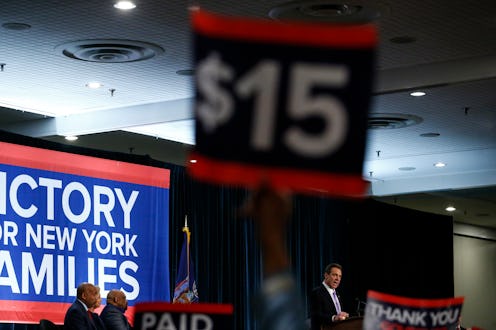News
Hourly Employees In These States Will Get A Raise
Four states voted on Nov. 8 to raise their minimum wages. Arizona, Colorado, Maine, and Washington approved raising the minimum wage, which means minimum wage workers in those states will see a raise in pay, though it won't be immediate. The increases will phase in over the next few years, and be revisited in 2020, to make the necessary adjustments for cost of living expenses.
The amount of hourly wage increase proposed varies from state to state. In Washington, residents voted on the largest increase from a current $9.47 to $13.50. Additionally, the initiative would require businesses to offer paid sick leave for their employees. Arizona voted on a similar set of measures, but with a maximum wage increase to $12.00, rather than $13.50.
Colorado voted on bumping up the minimum wage from $8.31 to an eventual $12.00 in 2020, with an immediate raise to $9.30. After that, workers would get a $.90 raise, arriving at the $12.00 mark over the course of three years. This is similar to the measure voted on in Maine, but tipped workers in the Pine Tree State would have also seen their minimum wage go up. The Maine ballot measure provides for an immediate base wage of $5.00 for tipped workers, like many in the restaurant workers, and then adds a $1.00 increase every year, until their wage levels reach the $12.00 minimum for workers statewide. It looks like it might be designed as a potential way to phase out tipping altogether.
The goal of some of the most vocal activists is to get the minimum wage baseline up to $15.00 an hour. Workers at fast food industries, for example, launched their own initiative, Fight for $15, which has grown into an international movement that recognizes the struggles of minimum wage workers. Currently, the states of California, New York, the District of Columbia, and the city of Seattle have put the $15.00 minimum wage into practice.
The push for a federally-mandated $15.00 hourly minimum wage is the ultimate objective for many. But others contend that varying operational and living costs make a uniform wage increase not only unnecessary, but actively harmful to local economies. Considering the enormous difference in, say, residential rent costs between New York City and a suburb of Dallas or Louisville, it is far easier for a minimum wage worker in the south to live comfortably off a $12.00/hr minimum wage than a New Yorker who makes $15.00. Similarly, business in less affluent areas of the country cannot necessarily afford to pay their employees $15.00/hr without charging customers a significant increase as well, which can create a cycle of inflation.
The good news for minimum wage workers in Arizona, Colorado, Maine, and Washington is that their fellow locals have all agreed that an hourly wage increase is a good idea for everyone.
